|
Books Should Be Free Loyal Books Free Public Domain Audiobooks & eBook Downloads |
|
|
Books Should Be Free Loyal Books Free Public Domain Audiobooks & eBook Downloads |
|
Essay/Short Nonfiction |
|---|
|
Book type:
Sort by:
View by:
|
By: Oliver Lodge (1851-1940) | |
|---|---|
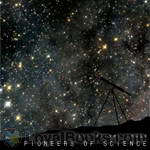 Pioneers of Science
Pioneers of Science
This book takes its origin in a course of lectures on the history and progress of Astronomy arranged for Sir Oliver Lodge in the year 1887. The first part of this book is devoted to the biographies and discoveries of well known astronomers like Copernicus, Brahe, Kepler, Galileo and Newton. In the second part, the biographies take a back seat, while scientific discoveries are discussed more extensively, like the discovery of Asteroids and Neptune, a treatise on the tides and others. | |
By: Oliver Wendell Holmes (1809-1894) | |
|---|---|
 Autocrat of the Breakfast Table
Autocrat of the Breakfast Table
| |
By: Oliver Wendell Holmes, Sr. (1809-1894) | |
|---|---|
 My Hunt After 'The Captain'
My Hunt After 'The Captain'
Holmes describes his frantic search through Civil War torn landscapes for his wounded son, the future Supreme Court Justice. Originally published in The Atlantic Magazine, 1862. Holmes, Sr. (1809 -1894) was an American physician, poet, professor, lecturer, and author. He was regarded by his peers as one of the best writers of the 19th century. His most famous prose works are the "Breakfast Table" series, which began with The Autocrat of the Breakfast Table (1858). He is also recognized as an important medical reformer. | |
By: Oscar Wilde (1854-1900) | |
|---|---|
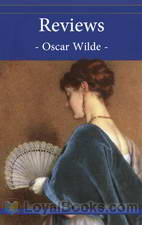 Reviews
Reviews
Wilde’s literary reputation has survived so much that I think it proof against any exhumation of articles which he or his admirers would have preferred to forget. As a matter of fact, I believe this volume will prove of unusual interest; some of the reviews are curiously prophetic; some are, of course, biassed by prejudice hostile or friendly; others are conceived in the author’s wittiest and happiest vein; only a few are colourless. And if, according to Lord Beaconsfield, the verdict of a continental nation may be regarded as that of posterity, Wilde is a much greater force in our literature than even friendly contemporaries ever supposed he would become... | |
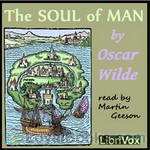 The Soul of Man
The Soul of Man
“(T)he past is what man should not have been. The present is what man ought not to be. The future is what artists are.”Published originally as “The Soul of Man Under Socialism,” this is not so much a work of sober political analysis; rather it can be summed up as a rhapsodic manifesto on behalf of the Individual. Socialism having deployed technology to liberate the whole of humanity from soul-destroying labour, the State obligingly withers away to allow the free development of a joyful, anarchic hedonism... | |
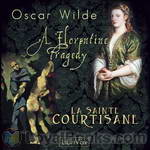 A Florentine Tragedy and La Sainte Courtisane
A Florentine Tragedy and La Sainte Courtisane
Two short fragments: an unfinished and a lost play. A Florentine Tragedy, left in a taxi (not a handbag), is Wilde’s most successful attempt at tragedy – intense and domestic, with surprising depth of characterisation. It was adapted into an opera by the Austrian composer Alexander Zemlinsky in 1917. La Sainte Courtisane, or The Woman Covered in Jewels explores one of Wilde’s great idées fixes: the paradox of religious hedonism, pagan piety. Both plays, Wildean to their core, revel in the profound sadness that is the fruit of the conflict between fidelity and forbidden love... | |
 Essays and Lectures
Essays and Lectures
| |
 Selected Prose of Oscar Wilde
Selected Prose of Oscar Wilde
| |
 Shorter Prose Pieces
Shorter Prose Pieces
| |
 Letters of Oscar Wilde, Volume 1 (1868-1890)
Letters of Oscar Wilde, Volume 1 (1868-1890)
This first collection of the correspondence of Oscar Wilde begins with the Irish playwright's earliest extant letter, thanking his mother for the hamper she had sent to him at school. It includes letters about his travels in Italy, his American lecture tour, the staging of his first play , arrangements for the publication of a friend's poetry collection, and exchanges in the press with artist James McNeill Whistler. The letters, some of which have been excerpted or redacted, are sourced from auction catalogues, newspapers, biographies, and other texts in the public domain... | |
 Letters of Oscar Wilde, Volume 2 (1890-1895)
Letters of Oscar Wilde, Volume 2 (1890-1895)
This second collection of the correspondence of Oscar Wilde includes letters written when the Irish playwright was at the height of his success. Wilde defends several of his works from criticism and even censorship, and writes "prose poems" to his lover, Lord Alfred Douglas, that will eventually be read out in court. The letters, some of which have been excerpted or redacted, are sourced from auction catalogues, newspapers, biographies, and other texts in the public domain. For a complete collection of Wilde's letters, please see "The Complete Letters of Oscar Wilde," edited by Merlin Holland and Rupert Hart-Davis. - Summary by Rob Marland | |
 Letters of Oscar Wilde, Volume 4 (1897-1898)
Letters of Oscar Wilde, Volume 4 (1897-1898)
This fourth collection of the correspondence of Oscar Wilde includes the letters Wilde wrote while living in Berneval, in the months after his release from prison, and in Naples, where he shared a villa with his former lover, Lord Alfred Douglas. In a long letter to the editor of the Daily Chronicle, Wilde describes the cruelties of prison life. At this time Wilde was writing The Ballad of Reading Gaol, and the poem is a frequent topic in his letters to his friend, Robert Ross, and publisher, Leonard Smithers... | |
 Letters of Oscar Wilde, Volume 5 (1898-1900)
Letters of Oscar Wilde, Volume 5 (1898-1900)
This fifth and final collection of the correspondence of Oscar Wilde includes many letters to his friend, Robert Ross, and a long letter about prison reform to the editor of the Daily Chronicle. For most of the last three years of his life Wilde lived in Paris, but his letters also describe visits to Switzerland and Italy. The collection ends with one of Wilde's last surviving letters, which he wrote from his deathbed to beg a friend for money to pay his medical bills. The letters, some of which have been excerpted or redacted, are sourced from auction catalogues, biographies, collections of letters to Ross, and other texts in the public domain... | |
By: Patrick Henry (1736-1799) | |
|---|---|
 The Anti-Federalist Papers
The Anti-Federalist Papers
During the period of debate over the ratification of the Constitution, numerous independent local speeches and articles were published all across the country. Initially, many of the articles in opposition were written under pseudonyms, such as “Brutus”, “Centinel”, and “Federal Farmer”. Eventually, famous revolutionary figures such as Patrick Henry came out publicly against the Constitution. They argued that the strong national government proposed by the Federalists was a threat to the rights of individuals and that the President would become a king... | |
 Give Me Liberty or Give Me Death
Give Me Liberty or Give Me Death
This speech was given March 23, 1775, at St. John’s Church in Richmond, Virginia, and is credited with having singlehandedly convinced the Virginia House of Burgesses to pass a resolution delivering the Virginia troops to the Revolutionary War. In attendance were Thomas Jefferson and George Washington. Reportedly, the crowd, upon hearing the speech, jumped up and shouted, “To Arms! To Arms!” | |
By: Philander Misaurus | |
|---|---|
 Honour of the Gout
Honour of the Gout
This droll and 'enflammatory' pamphelet doth be a grondebreaking worke of musing upon a great aflicktion of Man, upon the better nature of that aflicktion, and upon the vain and mischievous cheats who affeckt to cure it. The gauntlet here so-toss'd by Philander Misaurus was later pick'd up by surgeon John Marten in his rejoinder, titled by the name–"The Dishonour of the Gout". Which seeketh to shew all minds swayed by Philander's prettie words that—indubitably—Gout is misfortune. - Summary by Alasdair | |
By: Pictorial Photographers of America | |
|---|---|
 Pictorial Photography in America 1920
Pictorial Photography in America 1920
| |
 Pictorial Photography in America 1922
Pictorial Photography in America 1922
| |
 Pictorial Photography in America 1921
Pictorial Photography in America 1921
| |
By: Plato (424/423 BC - 348/347 BC) | |
|---|---|
 Apology
Apology
The Apology of Socrates is Plato's version of the speech given by Socrates as he unsuccessfully defended himself in 399 BC against the charges of "corrupting the young, and by not believing in the gods in whom the city believes, but in other daimonia that are novel" (24b). "Apology" here has its earlier meaning (now usually expressed by the word "apologia") of speaking in defense of a cause or of one's beliefs or actions (from the Ancient Greek ἀπολογία). | |
By: Ralph Bergengren (1871-1947) | |
|---|---|
 The Perfect Gentleman
The Perfect Gentleman
| |
By: Ralph W. Bell | |
|---|---|
 Canada in War-Paint
Canada in War-Paint
There is no attempt made in the little sketches which this book contains to deal historically with events of the war. It is but a small Souvenir de la guerre—a series of vignettes of things as they struck me at the time, and later. I have written of types, not of individuals, and less of action than of rest. The horror of war at its worst is fit subject for a master hand alone. - Summary by the author, Capt. Ralph W. Bell | |
By: Ralph Waldo Emerson | |
|---|---|
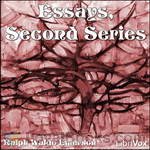 Essays, Second Series
Essays, Second Series
Ralph Waldo Emerson (1803 – 1882) was an American essayist, philosopher, and poet, best remembered for leading the Transcendentalist movement of the mid 19th century. His teachings directly influenced the growing New Thought movement of the mid-1800s. | |
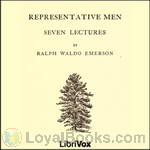 Representative Men
Representative Men
A series of biographical lectures originally published in 1850. Each chapter is a philosophical treatment of the life of an intellectual. The six representatives are Plato, Swedenborg, Shakespeare, Montaigne, Napolean and Goethe. (Introduction by S. Kovalchik) | |
 Essays by Ralph Waldo Emerson
Essays by Ralph Waldo Emerson
| |
 Nature (version 2)
Nature (version 2)
First published anonymously in 1836, Nature marks the beginning both of Emerson’s literary career and the Transcendentalist movement. Asking why his generation “should not also enjoy an original relation to the universe,” Emerson argues that “Man is a god in ruins” who might yet be redeemed by the renewal of harmony with nature. Encompassing themes that would preoccupy him for years to come, including the repressive force of social routine, the divinity of nature, and the creative potential of the individual, Nature reflected recent developments in European philosophy and literature even as it pushed American artists to break new ground... | |
By: Randolph Silliman Bourne (1886-1918) | |
|---|---|
 Untimely Papers
Untimely Papers
This is a posthumous collection of essays by Randolph Bourne. Many originally appeared in the journal "The Seven Arts," before the controversial end to its run. Also included is the unfinished manuscript of "The State," the book Bourne worked on until his tragic death in December, 1918, at the hands of the Spanish flu pandemic. In the words of the book's editor, poet James Oppenheim, "We have nothing else like this book in America. It is the only living record of the suppressed minority, and is, as so often the case, the prophecy of that minority's final triumph." - Summary by Ben Adams | |
 History of a Literary Radical, and Other Essays
History of a Literary Radical, and Other Essays
A posthumous collection of Bourne's writing from publications such as The Atlantic Monthly and early issues of The New Republic, with a long introduction by his friend and colleague Van Wyck Brooks. Includes the influential and perennially relevant essay "Trans-National America" as well as a fragment from the autobiographical novel on which Bourne was working at the time of his death. - Summary by Ben Adams | |
By: Richard King (1879-1947) | |
|---|---|
 Over the Fireside with Silent Friends
Over the Fireside with Silent Friends
| |
By: Richard Middleton (1882-1911) | |
|---|---|
 Monologues
Monologues
This is a collection of 32 highly diverting essays of English author Richard Middleton. Although Middleton is now best remembered for his ghost stories, he was also an accomplished poet and essayist. The musings collected in this volume cover a variety of topics, including poetry, art, and politics. - Summary by Carolin | |
By: Robert Baldwin Ross (1869-1918) | |
|---|---|
 Masques & Phases
Masques & Phases
| |
By: Robert Green Ingersoll (1833-1899) | |
|---|---|
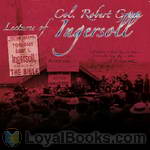 Lectures of Col. R. G. Ingersoll
Lectures of Col. R. G. Ingersoll
Colonel Robert Green Ingersoll (1833–1899) was a Civil War veteran, American political leader and orator during the Golden Age of Freethought, noted for his defense of atheism. This book is the first of two volumes collecting Ingersoll’s speeches. | |